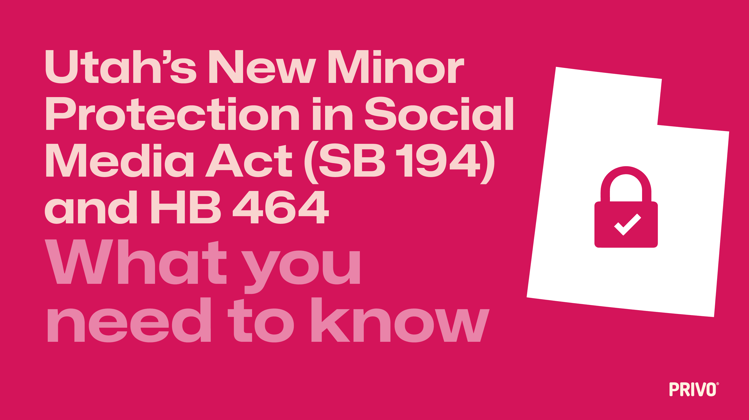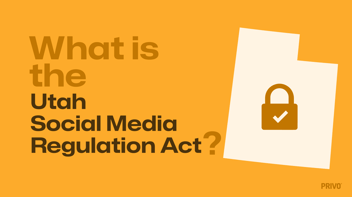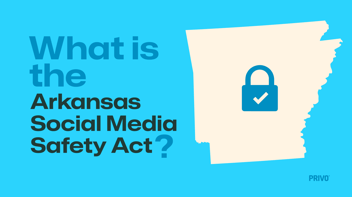
What You Need to Know About Utah’s New Minor Protection in Social Media Act (SB 194) and HB 464
Last updated on September 16, 2024
In early March of 2024, the Utah legislature repealed and replaced the Utah Social Media Regulation Act with SB 194 and HB 464. Utah lawmakers amended the Act in response to a lawsuit filed by an Internet trade association challenging the Act on constitutional grounds. Governor Cox signed the new bills into place on March 13, 2024.
HB 464 repeals the Utah Social Media Regulation Act completely and introduces a new provision allowing a private right of action for any harm to minors on their mental health caused by excessive use of a social media platform's algorithmically curated social media service.
SB 194, known as the Minor Protection in Social Media Act, enacts provisions related to age assurance and specific requirements a social media company shall do for Utah minor* account holders that include:
- Setting default privacy settings to prioritize maximum privacy.
- Offer supervisory tools for a Utah minor account holder that the Utah minor account holder may decide to activate.
- Verifiable parental consent.
*Minor means an individual under 18 years old.
Despite the Utah legislators' efforts to revise the law, it is important to note that HB 464 and SB 194 are facing opposition from trade associations and think tanks who believe that they still raise constitutional concerns. NetChoice has provided testimony against HB 464 here and SB 194 here. The U.S. District Court granted NetChoice's request for a preliminary injunction on September 10, 2024, while their case moves through the legal system.
Effective Date:
HB 464 effective date is May 1, 2024.
SB 194 is supposed to take effect on October 1, 2024, but is on hold due to a preliminary injunction.
Who needs to comply?
Social media companies that own or operate a social media service must comply. A "Social media service" means a public website or application that:
- displays content that is primarily generated by account holders and not by the social media company;
- permits an individual to register as an account holder and create a profile that is made visible to the general public or a set of other users defined by the account holder;
- connects account holders to allow users to interact socially with each other within the website or application;
- makes available to each account holder a list or lists of other account holders with whom the account holder shares a connection within the system; and
- allows account holders to post content viewable by other users.
"Social media service" does not include email; cloud storage; or a document viewing, sharing, or collaboration services.
Enforcement:
Under SB 194, up to $2,500 for each violation and the division may bring an action in court. In a court action by the Consumer Protection Division, the court may award any other relief that the court deems reasonable and necessary. If a court grants judgment or injunctive relief to the division, the court shall award the division: reasonable attorney fees; court costs; and investigative fees. A person who violates an administrative or court order issued for a violation of this chapter is subject to a civil penalty of no more than $5,000 for each violation. All money received for the payment of a fine or civil penalty imposed under this section shall be deposited into the Consumer Protection Education and Training Fund.
Under HB 464, if a court or fact finder finds that a Utah minor account holder suffered any adverse mental health outcome, the person seeking relief is entitled to:
- an amount equal to the greater of $10,000 for each adverse mental health outcome incidence; or the amount of actual damages; and
- an award of reasonable attorney fees and court costs.
A social media company is not subject to an enforcement action for a violation of Section 13-71-201 if the social media company implements and maintains an age assurance system that complies with rules made by the division.
Key Requirements:
SB 194 requires social media companies to:
- verify a new account holder's age using an approved system to determine whether a current or prospective Utah account holder on the social media company's social media service is a minor;
- implement a review process allowing account holders to appeal the account holder's age designation by submitting documentary evidence to establish the account holder's age range;
- enable maximum default privacy settings on a Utah minor account holder's account;
- restrict the visibility of a Utah minor account holder's account to only connected accounts;
- limit the Utah minor account holder's ability to share content to only connected accounts;
- restrict any data collection and sale of data from a Utah minor account holder's account that is not required for core functioning of the social media service;
- disable search engine indexing of Utah minor account holder profiles;
- restrict a Utah minor account holder's direct messaging capabilities to only allow direct messaging to connected accounts; and
- allow a Utah minor account holder to download a file with all information associated with their account;
- implement and maintain reasonable security measures, including data encryption, to protect the confidentiality, security, and integrity of personal information collected from a Utah minor account holder;
- provide supervisory tools and verifiable parental consent mechanisms on a Utah minor account holder's account;
- a social media company may not allow a Utah minor account holder to change the default data privacy setting without first obtaining verifiable parental consent; and
- provide confidentiality protections for minors' data.
The social media service shall provide advance notice to the parent describing information practices related to the minor account holder's personal information; and the social media service shall receive confirmation that the parent received the notice.
SB 194 also establishes the Division of Consumer Protection's enforcement powers relating to the Act and provides compliance safe harbors when social media companies implement approved systems for age assurance and verifiable parental consent. Lastly, it contains a severability clause.
HB 464 requires social media companies to:
- allow a private right of action related to harms to minors from excessive social media use and establishes related provisions;
- establish an affirmative defense for a social media company to defend against the private right of action.
Need help to comply with Utah’s SB 194 and HB 464?
Contact PRIVO for expert guidance and to see a demo of our compliant and easy to implement smart age gate, age verification and parental consent services to help your company comply.
For more information:
>> View the SB 194 bill
>> View the HB 464 bill


 Blog
Blog






 Facebook
Facebook Linkedin
Linkedin Blog
Blog

 Twitter
Twitter

